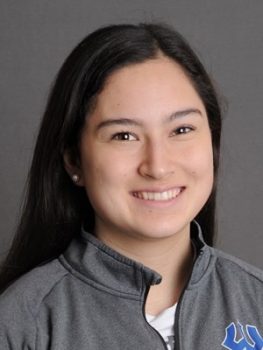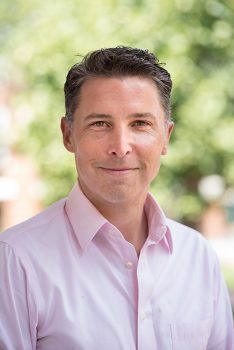Parsing a Pandemic Fifteen W&L faculty members and two alumnae have signed on to help teach a Fall Term course that will cover multiple aspects of the COVID-19 crisis.

COVID-19 has touched nearly every facet of life in every corner of the world, so it is appropriate that a new Fall Term course about the pandemic will draw faculty from departments across the Washington and Lee University campus, in addition to two alumni lecturers.
Perspectives on a Pandemic, an interdisciplinary course organized by Haight Associate Professor of Business Administration Drew Hess ’97 and Associate Professor of History Mikki Brock, will feature lessons from 15 different faculty members in topics including biology, economics, religion, journalism and politics. The virtual course was inspired in part by Tatiana Monteleone ’23, who heard about a similar course at another institution and approached Associate Provost Paul Youngman to request that W&L consider offering such a class.
“COVID affects everyone’s lives,” said Monteleone, who plans to follow a pre-med track at W&L. “It connects so many things, like the economy and the health care system, and it connects different aspects, such as physical and mental health. But there is a lot of information around the world about it, and it can be difficult to decipher what is true and what is fake news.”
Monteleone’s request was a timely one, as Hess and his colleague and spouse, accounting professor Megan Hess ’97, had already suggested an interdisciplinary COVID-related Spring Term course. There wasn’t enough time to pull off that course amid the switch to virtual instruction, but when Youngman connected Monteleone and Drew Hess, the idea quickly became a reality for Fall Term. A number of faculty members expressed interest in collaborating, and Brock signed on to co-lead the course.
“I see this as an ideal class for someone who is just broadly interested in the best that a liberal arts education has to offer,” Brock said. “It is really for the intellectually curious who want to be able to see things from all angles, which I think is a lot of W&L students.”
Biology professors David Marsh and Bill Hamilton will kick off the series of lectures with a lesson in the science of disease. Hamilton will return to the class in October to discuss the environmental impacts of the pandemic.
“Anytime you can take current events —and the pandemic is obviously a really current one —and put it in the classroom, it’s a great opportunity,” Hamilton said. “Biology could teach a whole 24 weeks on COVID.”
Brock and Assistant Professor of History Melissa Vise will share historical lessons from past plagues and pandemics since, as Brock noted, “This is not the first time a society has dealt with something of this magnitude. There are lots of examples of people grappling with things that seem fundamentally out of control, uncertain or frightening.”
Economics professor Art Goldsmith will take on the economics of a pandemic, while sociology professor Jon Eastwood will team up with economics professor Joseph Guse to lead the class through demographic perspectives on the pandemic. For that lesson, they plan to focus on rural populations, including Rockbridge County.
A lesson in law, order and constitutional questions during a pandemic will be led by Waxberg Professor of Politics and Law Mark Rush and W&L School of Law professor Alexandra Klein. Other lessons include one on the pandemic’s effect on mental health by cognitive and behavioral science professor Karla Murdock and sociology professor Lynny Chin, a look at the role of fake news and social media by journalism professor Mark Coddington and history professor Molly Michelmore, and a discussion of the relationship between religion and the pandemic with Fletcher Otey Thomas Professor of Religion Alex Brown. In addition, visiting law professor Alexandra Klein has invited the class to sit in on a virtual symposium about race and the pandemic that will be hosted by the Journal of Civil Rights and Social Justice.
“Of the faculty we approached, 95% were really enthusiastic and excited to be part of it and learn from other faculty members,” Drew Hess said. “One of things we never get to do is talk to colleagues in other departments about what they do. I hope this encourages more interdisciplinary research.”
Hess and Brock are also tapping into alumni expertise to enrich the course. Jennifer Beam Dowd ’96, deputy director of the Leverhulme Centre for Demographic Science at the University of Oxford, will present a lesson with Megan Hess on social networks, contact tracing and “quaranteams.” Kerry Egan ’95, a hospital chaplain and author of “On Living,” will join Brown for the religion discussion.
One of the challenges of teaching a class about a crisis that continues to unfold is that information evolves and perspectives change. For example, Drew Hess said that when they were first planning the course, the pandemic was not as politically divisive as it has become. But the changing nature of the topic is also a perk because it presents excellent opportunities for analysis and discussion.
“This class is such a special opportunity because we are living in the moment,” Monteleone said. “What is true could change between one day and the next.”
She’s looking forward to those robust discussions, as are at least 19 other students who plan to take the class. Many of those students are friends or acquaintances of Monteleone who heard about the class through her.
“I started reaching out to other students on the pre-med track, but also those interested in politics and economics and other disciplines,” she said. “Almost everyone was interested in it, and I think that’s the really special part about this class. It resonates with almost everybody because of how much COVID affects everyone’s lives.”
 Tati Monteleone ’23
Tati Monteleone ’23 Michelle D. Brock
Michelle D. Brock Drew Hess
Drew Hess
You must be logged in to post a comment.